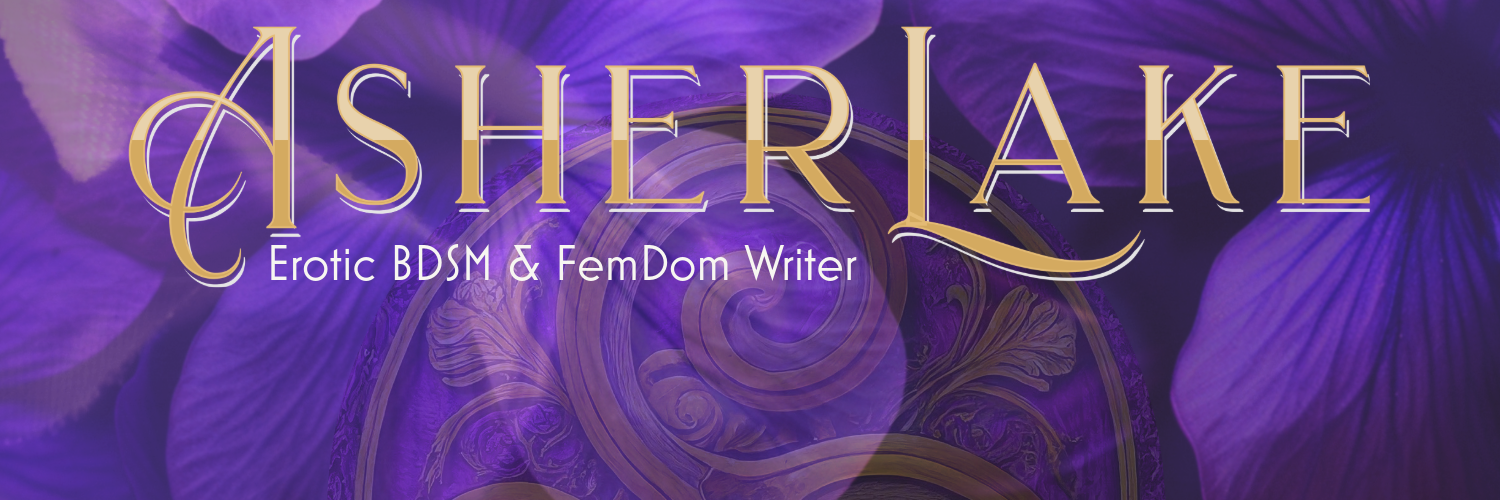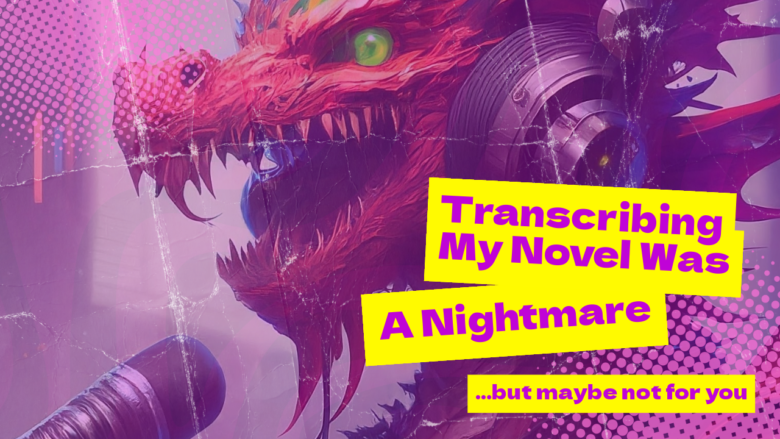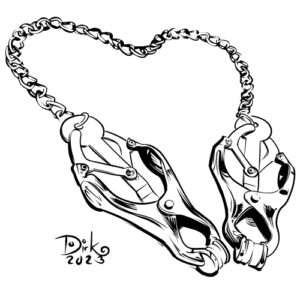Years ago, I had finished my first book, Dominatrix Boss, and it was time to write the sequel. I planned to write the sequel, keep the fires burning, and start to produce more books regularly. I knew how long it takes me to write a book, and I wanted to maximize my time, so I was searching for some help.
I read about ten books on producing faster novels and almost all of them suggested transcription. The advice went something like this, “If you can write 1000 words in an hour, you can transcribe 10,000 words by just speaking them! Save your poor fingers, and you can produce a book a month!”
I’m not here to tear down transcription, but it’s not for me. Maybe if I was writing a non-fiction book, it would be fine. But the path to getting my second book was delayed, in no small part, by the complications that I had with transcription. And I discovered something important about how I write in the process.
10,000 Words an Hour
I did my share of research on the topic of transcription, and I was ready to go. I was fired up about the process! I gave it everything I had.
My method began by writing out the details of a scene on an index card. Then I found a quiet place, often in my car, and just told my story to a recorder. When I was finished with a scene, I would take the file I had recorded and have the words transcribed by Dragon Naturally Speaking software.
First, let me say that it was very fast! I can see why people enjoy using this method. It absolutely works as the gurus had described. I wasn’t getting 10,000 words an hour, but I could see how you could easily get several thousand words an hour, and that you would undoubtedly improve over time.
When I transcribed the scenes, I noticed that the transcription missed a lot of words, it certainly got the character names wrong. The punctuation was terrible, and all the complex quotes and commas around speech were a total failure.
However, the general scene was fine. I got most of what I wanted, and it was fun to tell the story like I was sitting around a campfire. It was different, but it was fun.
My general fiction writing process is to write a chapter and go on to the next. The idea is to get a rough and rotten first draft out into the world, then polish on the second draft. So, I didn’t worry much about what I getting, the story was intact, and it was time to move on.
My desire to experiment led me to try a different method of dictation. My Pixel phone has an excellent app called “Recorder” that not only allows you to record audio, but it transcribes the words, and has one huge bonus…it does punctuation automatically! It still doesn’t format quotes correctly, but it would free me from having to speak much of the punctuation.
I switched to doing recordings, in my car, on the “Recorder” app and then transferred the transcriptions to a Word file. This method was a little smoother, but if I paused to think, or if I took too long, then it made stops in the middle of sentences. The names and many words were off too.
I put those issues aside and just kept going. All of that could be fixed in the second draft.
Eventually, I began to worry about how much work was going to be done in the second draft. When I wrote Dominatrix Boss it was super tight. I didn’t obsess over grammar, but my grammar knowledge is excellent, and I got it mostly right from the beginning. When I was working on my second draft of Dominatrix Boss the grammar issues were sparse and easily fixed. I knew it wouldn’t be that way with this transcribed work.
I tried one more method of telling my story through audio, and that was by sitting at my desk and speaking directly into Dragon Naturally Speaking’s program. My thought was that I could catch more of the errors as they were generated and fix them on the spot.
Yes, that worked, but what I realized after a while is that just typing the words cut out that problem entirely, and slowly I went from speaking the text to typing the text. I was back to writing my book the old-fashioned way…by typing it.
I transcribed about 65% of the sequel. The rest of the book was written by typing the text on my desktop computer or my laptop computer.
Editing Through the Jungle
When I got back to chapter 1 to begin my second draft, I immediately discovered that this was going to be a gnarly process. Because the text was transcribed months or years ago, a lot of the words that I figured I would know immediately were lost to me. The story was intact but little word flourishes had to be rewritten. Grammar was a nightmare. And something else was missing.
As I began to plod through this novel, I realized that my “voice” was absent. The way I usually write was not present. It read like it was written by someone else.
I’d like to point out that this was just my second novel. It’s not like I was Stephen King and had a massive back catalog of work to refer to, but it was clearly not the style that I had in the first book. And, I have grown over the years to be better a better author, and that wasn’t on the page either.
While I had saved a bunch of time in the drafting process, the editing process was almost like writing the whole thing over again, and probably took me 4 times longer than it did in the first novel.
The editing process for the second book was like walking through the jungle. It was challenging and exhausting and was not fun at all. I love writing and even editing, but I was not enjoying this.
The Light of Day
I just passed editing the chapters that were transcribed and I quickly breezed through several chapters that I typed. The contrast was stark. Suddenly, it felt like I was reading a real novel. The prose was so much better. It read like “me.” My voice had been restored. There was much less to correct, and it allowed me to focus on character arcs and deepening special moments, versus just hacking out the weeds.
I’m not through with editing this book, but I could finish it in an afternoon if I just had a little extra time.
As long as I can type, I won’t return to transcribing. While it did allow me to get that first draft out quickly, there were too many downsides on the back end. But no amount of editing snaggles would be worth losing my unique voice as a writer. That’s non-negotiable.
What I Learned
Using transcription for novel writing is not for me, but I want you to know a few things before you decide.
The Dragon Naturally Speaking software that I used was an older version. And now they have a subscription service, which will allow you to do your work through your smartphone or tablet, or just about anywhere you have access to the internet. I do not doubt that the current version of Dragon will work better than the version I used. And Dragon can be trained to pick up your character names, your accent, and your style, over time.
Even if Dragon transcribed my spoken words 100% I would still have the dire issue of the work not sounding like my voice, but it may still work for you.
I’ll also say that Microsoft Word has dictation and transcription software built in now. That wasn’t available until recently. I tried it to take some notes yesterday…and it works fantastic! Seriously. I watched it work, and I think what it’s doing is taking the words that I speak, doing its best to understand them, and then quickly running an AI check on what I say. So, there’s an extra step where it tries to make sense of my words in context. It looks like the same process that predictive text uses. In any case, it really works. It was far better than my experience with Dragon, but keep in mind that the Word version is built in and brand new. The Dragon software I was using is an older version.
There’s something else you need to know about Dragon. To buy it outright is well over $500. You can get a subscription, of course, but that’s going to cost a lot over a lifetime. The dictation and transcription software on Microsoft Word is part of the program, so it’s available, along with the whole Office Suite, for about $10 a month. Google Docs offers a dictation mode too, and that’s free, but you get what you pay for.
Writing through dictation or transcription is fast and it’s fun! I see why a lot of people are using it. There’s also the possibility that your voice won’t be affected by the process. Hey, it might even improve. If you’re the type of person who can tell a story and hold a captive audience, maybe you should try transcription, it might be more natural for you as a storyteller.
The writers who suggested transcription were handing over their raw chapters to someone else to clean up. The writers transcribed the work and then gave it to an editor who polished it, did a line edit, and then returned it. From there they went immediately to press. So, if you have the money to do that and you prioritize getting your books out as fast as possible, then this might solve the editing problem for you. I have no idea how much it would cost to clean up an entire novel written like that, but I do know it would not be joyful work. I also questioned how good the finished product would be.
I picked up three fiction books by authors who touted transcription to see what their final result was like. I wish I had done that before I started transcribing my work.
In all three cases, the writing was very utilitarian. It did the job, but it lacked a lot of life. I’d like to point out that a lot of successful writers put out similar prose. It’s just not what I’m shooting for in my work.
I could never turn over the final product to another person. I want what I present to you to be as full of passion and fun and my voice as possible.
Only you can decide if transcription is the right path. I know it’s not for me, but I’m glad that I tried it and learned something important about what kind of writer I am.
Maybe transcription will make you a better writer! It will likely make you more productive in the drafting phase. If you’re the type of person who tells long stories and people respond well to you, then it might improve your writing. Also, if you have the money to pay someone to clean up transcribed work, then it may be a slam dunk for you, but make sure you find the right person and you pay them well because it’s a lot of work on the back end.




